Top 7 Essential Oils to Help Eczema
last update: May 10, 2023
What is Eczema and How is it Caused?
Eczema is a skin condition that is characterized by patches of dry, itchy skin. Eczema can be caused by a variety of factors, including allergies, irritants, and climate changes. Treatment for eczema typically involves the use of moisturizers and corticosteroid creams. In severe cases, oral medications may also be prescribed.
While the exact cause of eczema is not entirely understood, it’s believed to be linked to an overactive response by the body’s immune system to an irritant. This response leads to the symptoms commonly associated with eczema, such as inflammation, redness, and intense itching. A study by John Hopkins university provides good insight to the underlying cause.
Environmental factors also play a significant role in eczema. Elements such as harsh soaps, detergents, certain fabrics, animal dander, and dust mites can trigger or exacerbate the condition. Weather changes, particularly dry and cold weather, can also lead to eczema flare-ups.
What are the Symptoms of Eczema
The symptoms of eczema can vary depending on the person. Some common symptoms include itchy skin, dry skin, redness, inflammation, and blisters. Eczema is a condition that can affect any part of the body, but it is most commonly found on the hands, feet, face, and chest.
One out of every ten adults in the United States suffers from some form of eczema. People of all ethnicities are affected by eczema at similar rates, proving that this skin condition is one that certainly does not discriminate.
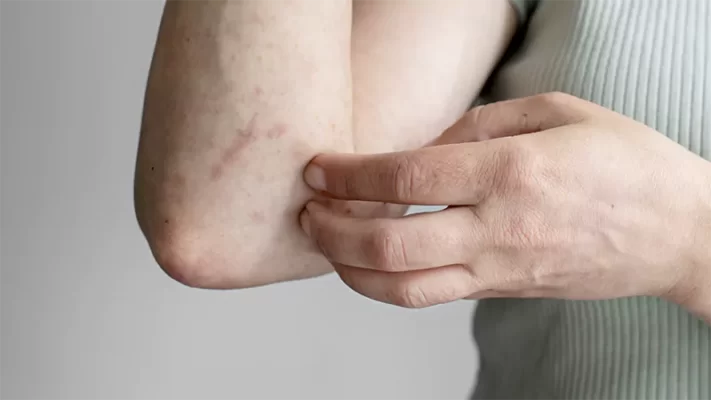
What are the Different Types of Eczema?
It’s important to note that eczema can come in all different forms, and no two eczema cases are going to be exactly alike. The 7 common types of eczema are:
-
Atopic Dermatitis – This is the most common form of eczema, often seen in infants and children, though it can occur at any age. It’s believed to be caused by an overactive immune system response to triggers inside and outside the body. This condition often results in itchy, red, and dry cracked skin that is more vulnerable to infections. It usually occurs in families with a history of allergies or asthma.
-
Contact Dermatitis – This form of eczema occurs when the skin comes into direct contact with an allergen or irritant, such as certain soaps, cosmetics, fragrances, jewelry, plants, etc. It’s divided into two types: allergic contact dermatitis (immune system reaction to an allergen) and irritant contact dermatitis (caused by repeated contact with a mild irritant like soap or detergent). Symptoms typically include redness, itching, and sometimes blisters.
-
Dyshidrotic Dermatitis – This type of eczema is characterized by small, itchy blisters on the edges of the fingers, toes, palms, and soles of the feet. It’s more common in women and is often associated with allergies and stress. Triggers of allergic reactions can include exposure to certain substances such as nickel, cobalt or chromium salts.
-
Neurodermatitis – Also known as lichen simplex chronicus, this form of eczema is characterized by patches of thick, scaly skin caused by excessive scratching or rubbing. It often affects adults and can be triggered by other forms of eczema or psoriasis. The itching can become a vicious cycle: the more you scratch, the itchier it gets.
-
Nummular Eczema – Also known as discoid eczema, this type is characterized by round or oval-shaped itchy patches of irritated skin. It’s more common in men and can be triggered by very dry skin, or skin injuries, such as burns or insect bites.
-
Seborrheic Dermatitis – This type of eczema affects areas of the body with a high density of oil-producing glands like the scalp, face, and upper chest. It’s characterized by red, scaly patches and can cause dandruff in adults. While the exact cause is unknown, it may be related to the yeast (Malassezia) that is present in the oil secretion on the skin or an irregular response of the immune system.
-
Stasis Dermatitis – Also known as venous eczema, this type of eczema affects the lower legs and is caused by poor circulation, typically from varicose veins or other chronic circulatory diseases. This leads to fluid build-up (edema), which can cause the skin to break down, itch, and develop sores.
Natural Ways to Treat Eczema
Essential oils along with carrier oils are one method that many use to treat their eczema, since the condition itself isn’t exactly curable. There is no magic pill, cream, or treatment that will take care of eczema for good, but treatment options do allow you to lessen the symptoms and clear up eczema outbreaks when they do occur. Along with carrier oils such as coconut oil, there are a few essential oils for eczema that are particularly beneficial to eczema prone skin.
The Top 7 Essential Oils to Help Eczema
While there are many known other essential oils for eczema. Here is a list of our top seven favorite essential oils to manage eczema.
Tea tree oil
Tea tree oil is one of the most powerful essential oils you can use for skincare, it can help to reduce inflammation and alleviate eczema conditions. Tea tree oil is antifungal, an anti-inflammatory and has antimicrobial properties and is used to treat skin infections. It has the ability to treat various forms of eczema and outbreaks stemming from various causes.
Peppermint oil
Peppermint essential oil can be used for so many different things, including helping to alleviate eczema symptoms. For those who have eczema prone skin conditions that come along with inflamed skin symptoms, peppermint oil has been known to help soothe irritated skin.
Eucalyptus oil
Eucalyptus essential oil is both antimicrobial and anti inflammatory properties, which can help to clear up some eczema conditions. With anti inflammatory properties, eucalyptus oil may be able to calm some of the skin irritation symptoms that come along with an eczema outbreak.
Lavender oil
Lavender oil is the quintessential calming oil, whether you’re using it in a diffuser for aromatherapy or applying alongside a carrier oil to the skin. For eczema, lavender essential oil is a powerful anti-inflammatory that can help to alleviate skin irritation while keeping the skin clean with antimicrobial benefits.
Clary Sage oil
Clary sage oil is another oil that may be beneficial in the treatment of eczema outbreaks. Often times, areas affected by eczema are irritated and itchy. This leads to further irritation and a vicious uncomfortable cycle. Clary sage oil works to help calm the skin so you can stop this cycle from occurring.
Rosemary oil
Rosemary essential oil is well known for its circulatory benefits, and in cases of eczema, this may help your skin to repair or recover quickly. If your eczema leaves behind scarring or hyperpigmentation, rosemary essential oil may help to fade these lingering spots as well.
Spearmint oil
For those looking for a gentler alternative to peppermint essential oil applied topically, but who want the same anti-itch properties, spearmint essential oil may be just what you’re looking for. Those with very sensitive skin may find it gentler than peppermint essential oil.
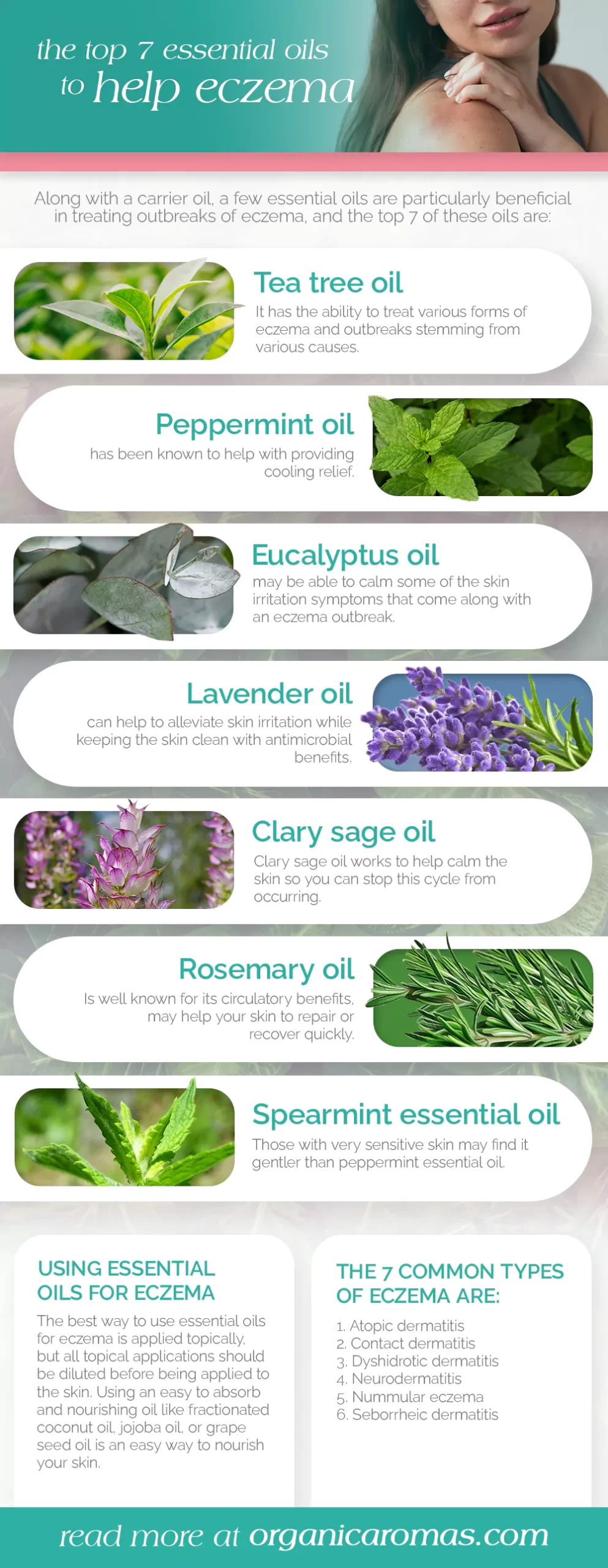
How to use Essential Oils For Eczema
Topical Application
The best way to use essential oils for eczema is to apply topically, but all topical applications should be diluted before being applied to the skin. Using an easy to absorb and nourishing oil like fractionated coconut oil, jojoba oil, or grape seed oil is an easy way to nourish your skin while reaping all of the rewards of using essential oils. Essential oils on their own can be caustic, harsh, and too powerful for topical eczema treatment, so a carrier oil is crucial for your safety.
Dilution – Typically, you’ll want to add in about 9 drops of essential oil to every 2 teaspoons of carrier oil for a 3% dilution. You may choose to opt for more dilute essential oils, 9 drops of 1 eczema calming oil, or you may choose to mix your oils to create your own eczema relief blend. Regardless of the number of oils you use, always stick to the same dilution method. 9 drops of peppermint oil will require the same dilution as 3 drops of rosemary oil, 3 drops of peppermint oil, and 3 drops of spearmint oil.
Nebulizing Diffusers
Nebulizing diffusers are devices that turn essential oils into a fine mist, allowing you to inhale them in their purest form. This can help with the stress and anxiety that often accompany chronic conditions like eczema. The nebulizing diffuser uses no heat, no water and no plastic and will fill a room up to 800 square feet with essential oils very quickly.
Essential Oil Recipes for Eczema
Here are three unique recipes that combine essential oils with carrier oils that are specifically designed for treating eczema symptoms:
1. Soothing Lavender Blend
Ingredients:
-
6 drops Lavender oil
-
6 drops Frankincense oil
-
30 ml Jojoba oil
Purpose and Benefits: Lavender is known for its calming and anti-inflammatory properties, while Frankincense can help rejuvenate the skin and reduce redness. Jojoba oil closely resembles our skin’s natural oil and is easily absorbed.
2. Healing Chamomile Blend
Ingredients:
-
8 drops Roman Chamomile oil
-
4 drops Tea Tree oil
-
30 ml Sweet Almond oil
Purpose and Benefits: Chamomile soothes irritation and reduces skin inflammation too. Tea Tree oil has antiseptic properties that can prevent infection from scratching, and Almond oil is a great moisturizer.
3. Invigorating Clary Sage Blend
Ingredients:
-
5 drops Rosemary oil
-
7 drops Clary Sage oil
-
30 ml Virgin coconut oil
Purpose and Benefits: Clary Sage has a calming effect and can also help with skin regeneration. Virgin coconut oil works well for sensitive skin.
What Medication is Traditionally Prescribed for Eczema?
There are a variety of drugs that can be prescribed for eczema, depending on the severity of the condition. Mild cases may be treated with over-the-counter creams or ointments, while more severe cases may require prescription medication. Corticosteroids are a common type of prescription drug used to treat eczema.

Alternative Eczema Treatments
-
Dietary Changes: Certain foods may trigger eczema in some people. Common triggers include dairy, gluten, soy, eggs, nuts, and certain types of fruits. An elimination diet, conducted under the supervision of a healthcare provider or a nutritionist, can help identify potential food triggers.
-
Probiotics: Probiotics are beneficial bacteria that can promote gut health. Some studies suggest that taking probiotics may help reduce eczema symptoms, especially in children.
-
Mind-Body Therapies: Stress and anxiety can often exacerbate eczema symptoms. Techniques such as mindfulness meditation, yoga, and tai chi may help reduce stress levels and potentially improve eczema.
-
Acupuncture and Acupressure: These traditional Chinese medicine techniques may help reduce itchiness and other eczema symptoms, though more research is needed in this area.
-
Phototherapy: This involves exposing the skin to ultraviolet (UV) light under medical supervision. It’s usually reserved for severe eczema that doesn’t respond to other treatments.
Remember, what works for one person might not work for another. It’s important to find a treatment plan that suits your individual needs and always consult with a healthcare provider before starting any new treatment.
Related Articles
[row]
[col span=”4″ span__sm=”12″]
[ux_image_box img=”55793″ link=”https://organicaromas.com/blogs/aromatherapy-and-essential-oils/the-best-essential-oils-for-dry-skin/”]
The Best Essential Oils for Dry Skin
[/ux_image_box]
[/col]
[col span=”4″ span__sm=”12″]
[ux_image_box img=”56088″ link=”https://organicaromas.com/blogs/aromatherapy-and-essential-oils/top-4-essential-oils-to-prevent-wrinkles/”]
Top 4 Essential Oils to Prevent Wrinkles
[/ux_image_box]
[/col]
[col span=”4″ span__sm=”12″]
[ux_image_box img=”55877″ link=”https://organicaromas.com/blogs/aromatherapy-and-essential-oils/the-best-essential-oils-to-help-with-acne/”]
The Best Essential Oils to Help With Acne
[/ux_image_box]
[/col]
[/row]

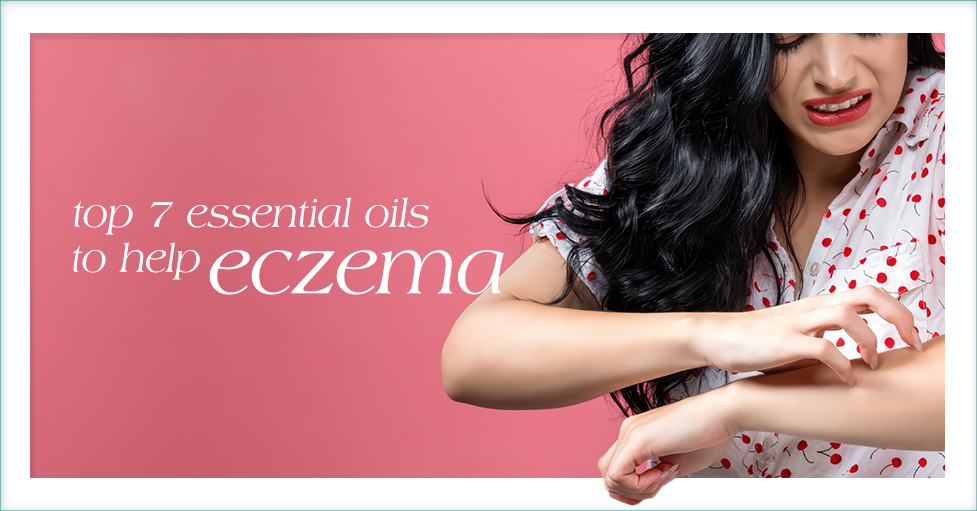
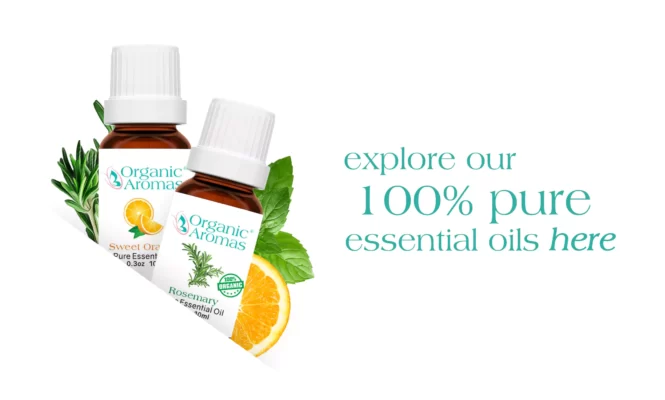
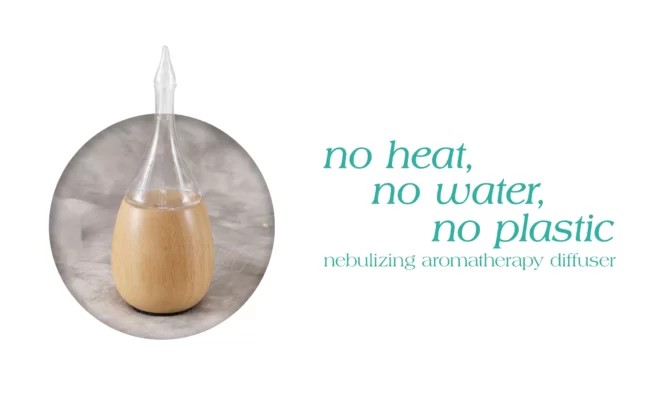

Very informative article, thank you very much.
Very interesting! I was really surprised at some of the oils recommended for eczema.
can’t wait to try these ideas. very helpful information thank you
I have always found peppermint oil to be amazing with my psoriasis and allergy symptoms all year round!
Thanks I didn’t realise all of these oils helped eczema.
sometimes I just can’t stop the itch with my eczema, I’m going to give the peppermint oil a try – such a helpful post, thank you
Can’t wait to try these out, I’ve tried so many chemist creams and they are only temporary!
Great article I get patches of eczema on my legs so I will have to try some of these
I only recently discovered peppermint oil and love it! It is wonderful for headaches too and I didn’t know it helped the skin as well.
interesting product
Great article, surprised clove oil isn’t included.
I did not realise there were so many types of eczema. Looking forward to trying some of these tips!
Great post, lots of useful info =)
My mother used to use Tea tree on my small eczema patches, however it used to rapidly fry them out and irritate the skin. I now use peppermint oil & calendula cream and find it much more soothing and effective.
I’be had eczema since I was little and mum always used eucalyptus oil on me! Works well!
Thank you so much for the informative article. My daughter has eczema so I will definitely be trying this out, especially the lavender as it’s one of my favourite essential oils
this is good to know
These are so helpful. Thank you!
A lot of interesting information.
Love the helpful and interesting information.
Truly a fabulous blog to learn this amazing natural skincare products for annoying eczema without any toxic chemical ingredients. Thank you.
I’ve been getting eczema a lot in the last few months, I’ve had acute bronchitis so I’m thinking that may have brought it on.
Very interesting i was surprised the Tea Tree Oil is good for eczema, will certainly tell my friend who suffers badly with it
My son has moderate eczema. Would be curious to try these natural remedies as they would be gentle on his skin.
Currently having a really bad time, breaking out in hives and plaques of irritation in addition to my eczema. A few drops of peppermint oil in my bath with some aveeno and the itch is gone. First time in over 6 weeks.
Lavender oil seems to help in so many ways.
interestingstuff
best info i have ever had , thankyou so much
my daughter occasionally has eczema this information is going to be a great help
I didn’t know this fact about lavender, I’ll try! (in addition, I love the smell) 🙂
I find natural oils can be so helpful but didn’t know about clary sage
I suffer from mild eczema myself so this was a brilliant and informative read, I’ll be trying out a few of these oils. Thanks!
Great ideas — will pass on the suggestions.
I really want to try these tips for my eczema.
these are super helpful tips
Very informative and helpful. Thanks for sharing.
This is very useful information. Thanks for teaching me how to use essential oils for all kind of things.
great idea will try
This is great information! My sister suffers from eczema and struggles to find relief. I’ll have to share this info with her.
Great ideas, will definitely try them
Great information, I love clary sage oil.
Tea Tree Oil is amazing for so many different things!
I have psoriasis and now I’m wondering if essential oils would help that. I’m going to ask my doctor. Thanks for all the info.
Good to know about these in general, even if you don’t have eczema.
Do you know if these piks are some for eczema treatment on infants?
Very insightful!
Love tea tree oil and its benefits